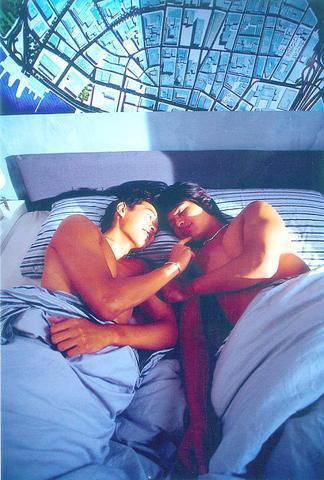If Taiwan's abundant TV soap operas have finally achieved something it is that they have helped create pretty-faced pop idols for the movie Formula 17 (
Formula 17 can be seen as one of those rare finds, not only because it is a gay romantic comedy, but it is also one of the few Taiwanese movies that discards the "tradition" of social realism. It is a commercial drama, sugar-coated with good-looking actors, bright colors, designer fashions and furniture. The movie does not intend to delve into deeper meaning about society or human feelings, as many other Taiwanese filmmakers try to do. As pure entertainment, it is indeed a different breed of Taiwanese movie.
Tien (Tony Yang,

PHOTO COURTESY OF THREE DOTS ENTERTAINMENT
Under the instruction of Yu and his campy friends, Tien learns to dress up and tries a few blind dates. He meets Pai (Duncan), the most chased (gay) bachelor in town and immediately falls for him. But Tien's "sisters" all advise him to stay away from this dangerous attraction, for Pai is a well-known playboy who, unlike the naive Tien, does not believe in love.
Formula 17 is surely trying to create a gay utopian vision of Taipei where there are no women, no heterosexual men, only pretty-looking or muscular gay men in bars, fashion stores or men's gyms. The underlying theme is love and believing in love.
In contrast to many Western gay movies such as The Birdcage or The Adventures of Priscilla, Queen of the Desert, there are no mentions of drag queens or transvestite phenomena, though there are some characters who have exaggerated camp qualities.
The scriptwriter of the movie tries hard, sometimes too hard, to be funny. There are plenty of jokes, but the film director isn't quite able to pull them off. In some of the scenes, the actors look as if they are reading the lines instead of acting.
Fortunately, the good casting and good performances have saved the movie. Tony Yang, Duncan and three actors playing the gay roles have done decent jobs, especially Yang, who shows a different side to his TV drama work. After Formula 17, he could be taking up roles in bigger movies.

By 1971, heroin and opium use among US troops fighting in Vietnam had reached epidemic proportions, with 42 percent of American servicemen saying they’d tried opioids at least once and around 20 percent claiming some level of addiction, according to the US Department of Defense. Though heroin use by US troops has been little discussed in the context of Taiwan, these and other drugs — produced in part by rogue Chinese Nationalist Party (KMT) armies then in Thailand and Myanmar — also spread to US military bases on the island, where soldiers were often stoned or high. American military policeman

Under pressure, President William Lai (賴清德) has enacted his first cabinet reshuffle. Whether it will be enough to staunch the bleeding remains to be seen. Cabinet members in the Executive Yuan almost always end up as sacrificial lambs, especially those appointed early in a president’s term. When presidents are under pressure, the cabinet is reshuffled. This is not unique to any party or president; this is the custom. This is the case in many democracies, especially parliamentary ones. In Taiwan, constitutionally the president presides over the heads of the five branches of government, each of which is confusingly translated as “president”

An attempt to promote friendship between Japan and countries in Africa has transformed into a xenophobic row about migration after inaccurate media reports suggested the scheme would lead to a “flood of immigrants.” The controversy erupted after the Japan International Cooperation Agency, or JICA, said this month it had designated four Japanese cities as “Africa hometowns” for partner countries in Africa: Mozambique, Nigeria, Ghana and Tanzania. The program, announced at the end of an international conference on African development in Yokohama, will involve personnel exchanges and events to foster closer ties between the four regional Japanese cities — Imabari, Kisarazu, Sanjo and

Sept. 1 to Sept. 7 In 1899, Kozaburo Hirai became the first documented Japanese to wed a Taiwanese under colonial rule. The soldier was partly motivated by the government’s policy of assimilating the Taiwanese population through intermarriage. While his friends and family disapproved and even mocked him, the marriage endured. By 1930, when his story appeared in Tales of Virtuous Deeds in Taiwan, Hirai had settled in his wife’s rural Changhua hometown, farming the land and integrating into local society. Similarly, Aiko Fujii, who married into the prominent Wufeng Lin Family (霧峰林家) in 1927, quickly learned Hoklo (commonly known as Taiwanese) and